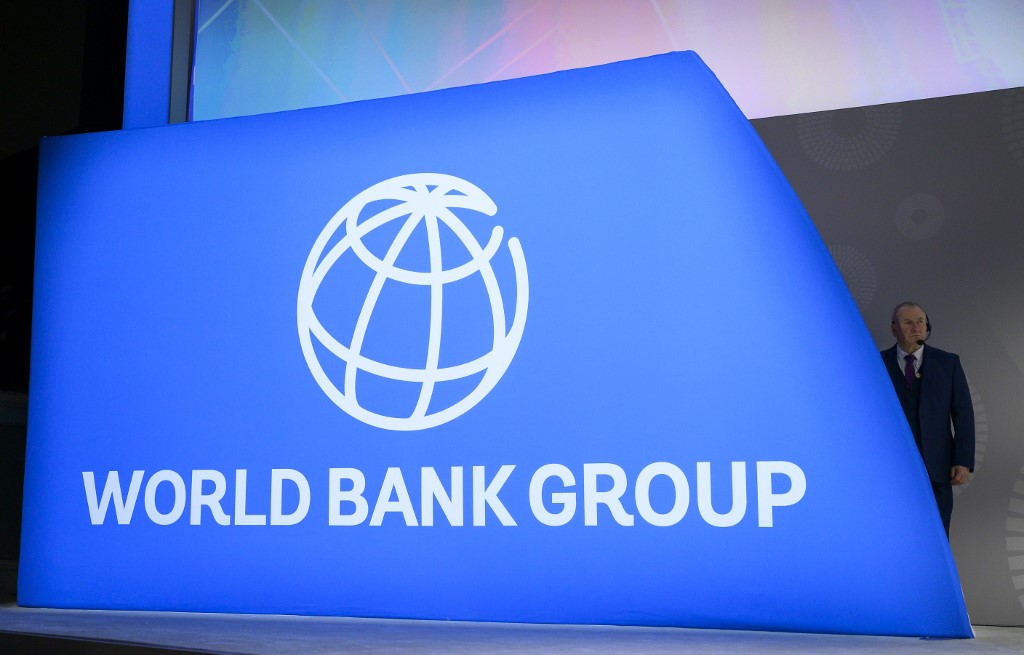
A stage director looks on at the IMF/World Bank Annual Fall Meetings Plenary Session in Washington, DC, on October 18, 2019. (Photo by Andrew CABALLERO-REYNOLDS / AFP)
MANILA, Philippines—Reinvigorated domestic demand, as shown by strong imports increase last November amid further economic reopening, likely boosted gross domestic product (GDP) in the fourth quarter of 2021 by 6.7 percent year-on-year, UK-based think tank Pantheon Macroeconomics said on Wednesday (Jan 12).
World Bank said in its latest flagship global report that the Philippines and other tourism-dependent economies in the region could revert to their pre-pandemic output levels only this year.
In a report, Pantheon Macroeconomics senior Asia economist Miguel Chanco said that while his fourth-quarter forecast was lower than the third-quarter’s 7.1-percent year-on-year growth, the projected October-to-December output would likely be 4.1-percent higher than July-to-September GDP.
Chanco’s quarter-on-quarter growth forecast for the fourth quarter of 2021 was higher than the actual third-quarter output increase of 3.8 percent from the second-quarter level.
“The trade numbers show clearly that domestic demand enjoyed a broad-based pop in the fourth quarter, though the November jump in consumer and capital goods imports is unsustainable,” Chanco said.
The latest government data showed that the Philippines’ end-November 2021 foreign trade volume climbed 24 percent year-on-year to $174.7 billion, mainly on the back of the 30.4-percent jump in imports to $106.3 billion.
Chanco expects private consumption to have grown by a “still-solid” 1.8 percent from October to December 2021 although slower than third quarter’s 7-percent growth, due to a higher base in 2020.
On the other hand, Chanco said low-base effects would elevate investment gains by 5.5 percent in the fourth quarter. “Inventories probably did do a lot of the heavy lifting on this front, and it looks like it still won’t be enough for total capex to end the year back to the pre-pandemic level,” he said.
However, Chanco said net-exports trade could be a drag to fourth-quarter economic growth, because overseas sales “have been particularly lackluster, with the Philippines’ semiconductors still failing to capitalize from the global chip shortage.”
In its January 2022 Global Economic Prospects report released on Tuesday night, World Bank said “tourism-dependent economies are not expected to recover to pre-pandemic levels until 2022 (Cambodia, Malaysia, and the Philippines) or 2023 (Thailand).”
Similar to its forecasts last December, the Washington-based multilateral lender projected the Philippines to have ended 2021 with 5.3-percent GDP growth, above the government’s upgraded 5 to 5.5 percent target.
The World Bank’s 2021 growth forecast for the Philippines was the second highest in East Asia and Pacific, after China’s 8 percent.
The World Bank noted that on top of the prolonged pandemic, the Philippine economy was also challenged by sustained weakness in international tourism, high inflation, and strong typhoons last year.
The Philippines was nonetheless among the countries which benefited the most from resilient cash remittances by migrant workers amid the prolonged pandemic, World Bank said.
For 2022, World Bank’s GDP forecast of 5.9-percent growth was below the government’s more ambitious 7 to 9 percent goal. Its 2023 growth projection of 5.7 percent was also lower than the government’s target of 6 to 7 percent.
In 2022, World Bank projections showed the Philippines to likely have the third-fastest expansion in the region after Palau’s 12 percent and Fiji’s 7.8 percent, whose strong growth rates this year would come on the back of their three straight years of economic recessions.
The World Bank said the Philippines’ growth this year would be “supported by sustained public investment and recovering household consumption.”
With still fragile economic recovery and risks wrought by COVID-19’s Omicron strain, the World Bank expects a gradual unwinding of governments’ fiscal policy support in the Philippines, Indonesia, Malaysia, and Thailand.